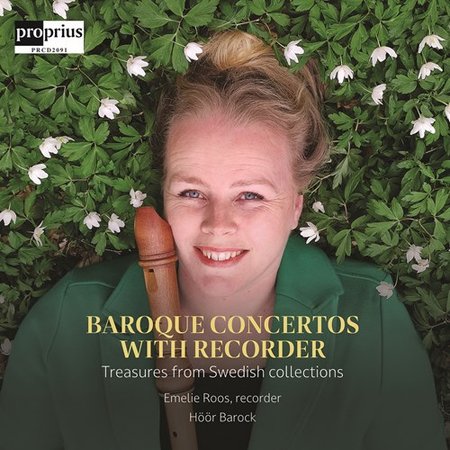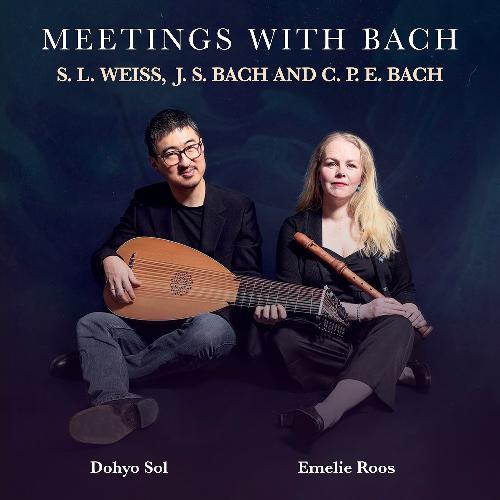EMELIE ROOS
Blockflöjt / Recorder
Foto: Aija Svensson
BIOGRAPHY
Emelie grew up in Höör with folk music, violin, recorder and singing. After high school in music class, Emelie took courses in literature and musicology in Lund, before she decided to try playing music full-time at Ingesund Folk High School's music program. After that, Emelie studied to be a musician at the Royal Danish Conservatory of Music in Copenhagen and the Royal College of Music in Stockholm, with Dan Laurin as teacher of recorder. Emelie has also studied classical singing at the Music Academy.
Emelie figures as soloist, chamber musician and project manager in various contexts. She plays regularly with the Höör Baroque ensemble; in Duo SolRoos with lutenist Dohyo Sol, and sings gregorian in the singing ensemble Gemma.
Emelie has played with leading baroque ensembles and orchestras, such as Drottningholmsteatern, Malmö Stadsteater, Malmö Opera, Göteborgs symfonikerna, GöteborgBaroque, Karlsson Baroque, Arte Dei Suonatori (POL), Camerata Öresund (DK), Drottningholm Baroque Ensemble, Kvinnoorkestern.
Emelie is, together with her husband Dohyo Sol, artistic director of the award winning and internationally acclaimed ensemble Höör Barock, along with its affiliated festival of the same name.
Höör Baroque ensemble and festival. Höör Baroque, with its well-attended annual summer festival (since 2012) and with guest appearances all over the country, and in Denmark, Iceland and Germany, has established itself as one of the leading Swedish baroque ensembles of today.
The ensemble has made four critically acclaimed recordings on the BIS label. Already after the first album, it was written in Germany that the ensemble had "played their way into the Champion's league of early music ensembles" (Toccata Early Music Magazine, DE). With "Golovinmusiken", recorded under the musical direction of Dan Laurin, the ensemble won a Grammy for best classical recording of 2020. The ensemble's recordings are played extensively on Swedish radio P2 and have given great attention internationally.
Emelie has been awarded scholarships from The Royal Swedish Academy of Music and the Friends of Drottningholm Palace Theatre, and for Höör Barock - Höör Cultural Scholarship and the Höör Ambassador Prize.
ABOUT EMELIE
Emelie Roos is one of Sweden´s foremost recorder virtuosos and has a diverse musicianship.
Emelie lives in Höör in southern Sweden, and has put this village on the international classical music map with award winning ensemble Höör Barock. In 2020 Höör Barock won a Swedish Grammy, and in 2022 they released their fourth critically acclaimed album "Baroque Concertos with recorder - Treasures from Swedish collections", with Emelie as soloist.
In May 2024, the album "Meetings with Bach - S L Weiss, J S Bach & C P E Bach" was released on Proprius/Naxos Sweden, with Duo Solroos, featuring Dohyo Sol and Emelie Roos.
Quotes from the press:
"A playing that is as skillful as it is sensitive to detail"
Göteborgsposten
"Emelie Roos with her wonderful recorder playing on a flauto di voce ... "how a flute part can breathe and articulate with purely hypnotic effect."
Dagens nyheter
"The soloist takes us on the most breathtaking escapades with an unfailing sense of style"
"virtuosity is never allowed to become an end in itself, it is always the musical expression and embodiment that is at the center."
Tidig musik
On Höörs Barock's fourth album, which was released in September 2022 on Proprius/ Naxos Sweden, Emelie is a soloist in baroque music taken from Swedish music collections, . "Baroque concertos with recorder - treasures from Swedish collections" contains several works that have not been recorded before and which Emelie has brought out from the Akademiska Kapellet in Lund's music collections. The recording has attracted a lot of attention and been praised on the radio and in newspapers:
"Devotion, artistry, esprit and expertise" (Klassik Heute, Germany)
"... The performances are so well executed, stylish and sunny" (Gramophone, UK).
More about Höör Baroque can be found onwww.hoerbarock.se
Emelie has also worked a lot with music and young people - as a project employee at Musik i Syd Unga, with children's performances, project manager for Miracle Festivals at Malmö museums and baroque opera for young people. And as a recorder and ensemble teacher at the senior high school Malmö Latin, Höör Culture school, Malmö Music Academy (in methodology). Emelie is also working with the project "Recorder Skåne", in wich a part is the summer courses of Glimåkra Recorder Days.
In 2022 Emelie initiated the forming of the national "Swedish Recorder Association".
DUO SOLROOS
Lutenist Dohyo Sol, and recorder player Emelie Roos, are both admired virtuosos on their respective instruments, and highly regarded on the Early Music scene- that of the music of the Medieval, Renaissance and Baroque periods.
Despite the fact that Emelie and Dohyo have been performing together for many years, the cd ’Meetings with Bach’ is their highly anticipated debut recording as a duo.
What really happened during those long summer days in Leipzig, when master lutenist Silvius Weiss visited the home of Johan Sebastian Bach? Improvisational duels of excellence, or a more relaxed musical dialogue between friends? Contemporary witnesses recall there being ”rare and elegant music played during this time”. We also know that it was during this period that Bach added a congenial upper part to music originally composed by Weiss purely for solo lute, namely his sonata in A Major. This augmentation added a new dimension and perspective onto Leopold Weiss’ already masterful composition, earning it a place in the catalogue of Bach’s works, as BWV 1025. On the cd ”Meetings with Bach”, we are also presented with Bach’s second cello suite in Dohyo Sol’s own transcription for lute. Of the encounters with Bach on this colourful recording, we are met with his son, Carl Philip Emmanuel Bach, whose dynamic and frequently eruptive music stands in stark contrast to the more fashionable gallant-style of the time.
DUO CONCERT PROGRAMS
"In the garden of Bach"
In the summer of 1739, JS Bach's eldest son, Wilhelm Friedemann Bach, travels home to visit his family in Leipzig. With him is his friend and musician colleague from the court, the famous lutenist Silvius Leopold Weiss. They stay for four weeks and the Bach house is filled with chamber music and improvisation. It is probably then that the remarkable work BWV 1025 comes into being - a solo suite for lute that Weiss had previously written, an upper part is added by Bach's hand.With surprising playfulness, Bach puts himself into Weiss's work - sometimes reinforcing the lute part, sometimes shining himself...
The concert program "In the Garden of Bach" offers this work as well as other works by Johann Sebastian Bach and his family members.
"Soft lute and sweet flute"
A journey with music from the time of the Knights, the Renaissance and up to the 18th century. The duo plays a number of different lutes and flutes, which belong to the repertoire and sound ideals of the different times.
Music by, for example, Ferrabosco, Dowland, Van Eyck, Kapsberger, Castello and Bach.


